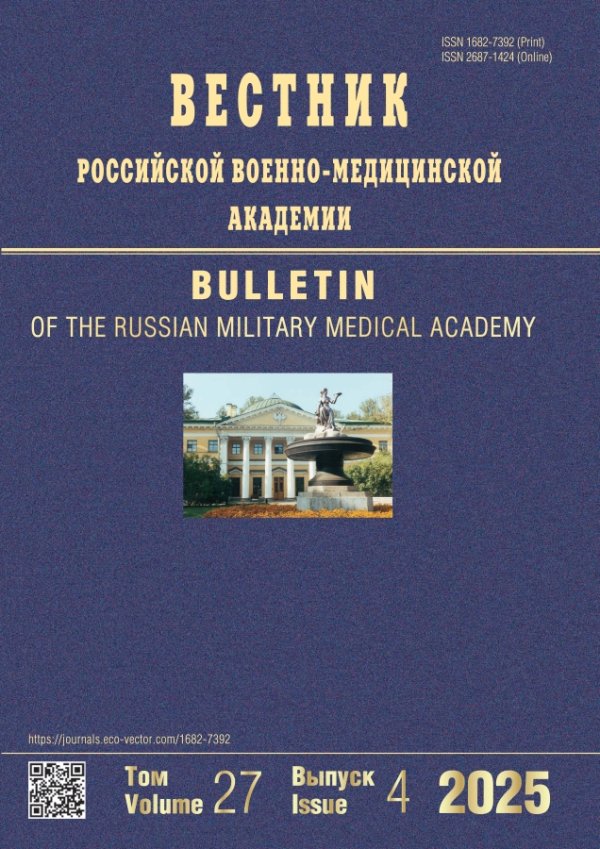The need to create and implement a platform for managing the professioyal reliability of military personnel of the armed forces of the russian federation, based on the principles of personalizet medicine
- Authors: Kutelev G.G.1, Cherkashin D.V.1, Trishkin T.V.2, Kryukov E.V.1, Fisun A.Y.3, Marchenko M.A.1, Shulenin K.S.1, Krivoruchko A.B.1, Sobolev A.D.1
-
Affiliations:
- Military Medical Academy named after S.M. Kirov
- Main Military Medical Directorate of the Ministry of Defence of the Russian Federation
- ERA Military Innovative Technopolis
- Issue: Vol 23, No 1 (2021)
- Pages: 177-186
- Section: Literature reviews
- URL: https://journals.rcsi.science/1682-7392/article/view/63648
- DOI: https://doi.org/10.17816/brmma63648
- ID: 63648
Cite item
Abstract
The article analyzes modern federal programs aimed at preserving the health and well-being of the population and creating a comfortable and safe environment for life and work. The article describes the arsenal of strategic directions for assessing the risk of developing diseases, diagnostic approaches and scientific principles that contribute to the successful implementation of evaluation measures. The possibility of clarifying the cardiovascular risk in the study of the role of military-professional factors in the formation of cardiovascular pathology in military personnel of the Armed Forces of the Russian Federation is discussed. The article analyzes the effectiveness of traditional diagnostic methods used by the medical service, as well as ways to improve this efficiency when using molecular genetic studies to search for associations with risk factors for neuropsychic and cardiovascular pathology. The article considers the practical necessity of creating a professional reliability management platform based on the principles of personalized medicine, which contributes to prolonging professional longevity and improving the combat readiness of servicemen of the Armed Forces of the Russian Federation. Such a method of implementing the professional reliability management platform will significantly increase the informativeness of traditional methods of early diagnosis of cardiovascular and neuropsychic pathology.
Full Text
##article.viewOnOriginalSite##About the authors
Gennadiy G. Kutelev
Military Medical Academy named after S.M. Kirov
Author for correspondence.
Email: gena08@yandex.ru
candidate of medical sciences, doctoral student
Russian Federation, Saint PetersburgDmitry V. Cherkashin
Military Medical Academy named after S.M. Kirov
Email: cherkashin_dmitr@mail.ru
doctor of medical sciences, professor
Russian Federation, Saint PetersburgTrishkin V. Trishkin
Main Military Medical Directorate of the Ministry of Defence of the Russian Federation
Email: moro5555@yandex.ru
candidate of medical sciences
Russian Federation, MoscowEvgeny V. Kryukov
Military Medical Academy named after S.M. Kirov
Email: evgeniy.md@mail.ru
doctor of medical sciences, professor
Russian Federation, Saint PetersburgAlexander Y. Fisun
ERA Military Innovative Technopolis
Email: a_fisun@list.ru
doctor of medical sciences, professor
Russian Federation, AnapaMarchenko A. Marchenko
Military Medical Academy named after S.M. Kirov
Email: andrew.marchenko@mail.ru
doctor of medical sciences, professor
Russian Federation, Saint PetersburgKonstantin S. Shulenin
Military Medical Academy named after S.M. Kirov
Email: shulenink@mail.ru
doctor of medical sciences, the associate professor
Russian Federation, Saint PetersburgAlexander B. Krivoruchko
Military Medical Academy named after S.M. Kirov
Email: krab25@mail.ru
candidate of medical sciences, associate professor
Russian Federation, Saint PetersburgAlexey D. Sobolev
Military Medical Academy named after S.M. Kirov
Email: sobolevvmeda@rambler.ru
adjunct
Russian Federation, Saint PetersburgReferences
- Talashmanova K. On the problem of understanding the professional reliability of the subject. Human capital. 2020;3(135):239–245. (In Russ.)
- Interstate standard GOST R 27.002-89 Reliability in technology. Basic concepts. Industrial product dependability. General concepts. Terms and definitions. Moscow; 1989. (In Russ.)
- Karpovich OG. The practice of the US conducting information warfare operations in the field of foreign policy. National security. Nota bene. 2017;1:112–126. doi: 10.7256/2454-0668.2017.1.20026. (In Russ.)
- Trishkin D, Fisun A, Makiev R, et al. The current state and prospects for the development of personalized medicine, high-tech healthcare and health-preserving technologies in the medical service of the Armed Forces of the Russian Federation. Bulletin of the Russian Military Medical Academy. 2019;3(67):145–150. (In Russ.)
- Fiatal S, Adany R. Application of single-nucleotide polymorphism-related risk estimates in identification of increased genetic susceptibility to cardiovascular diseases: a literature review. Frontiers in public health. 2018;5:358. doi: https://doi.org/10.3389/fpubh.2017.00358
- Miao L, Yin R, Yang S, et al. Association between single nucleotide polymorphism rs9534275 and the risk of coronary artery disease and ischemic stroke. Lipids in health and disease. 2017 Oct 5;16(1):1–9. doi: https://doi.org/10.1186/s12944-017-0584-5
- Yang J. Of markets and rights: Discourse in the 2008 and 2013 Global Action Plan for the Prevention and Control of Noncommunicable Diseases. Annals of Global Health. 2016; 82(3):472. doi: http://doi.org/10.1016/j.aogh.2016.04.293
- Makiev G, Hestanova S, Kertanov R et al. CRISPR-CAS9 genome editing system as a research tool and method for gene therapy for Fabry disease. Colloquium-journal. 2020;3(55):56–58. (In Russ.)
- Stepanov T, Innovative CRISPR / CAS9 method — as a potential treatment for human diseases. 2019:122–125. (In Russ.)
- Prutkoj A, Konstantinova T, Nikitina A. On the advantages, disadvantages and achievements of CRISPR-CAS9. Problems and Prospects for the Development of Russia: Youth Look into the Future. 2020;3:124–126. (In Russ.)
- Cherkashin D, Makiev R, Kirichenko Ju. New strategy to improve the effectiveness of prevention of cardiovascular diseases in the Armed Forces of the Russian Federation. Bulletin of the Russian Military Medical Academy. 2017;36(3):34–39. (In Russ.)
- Kryukov E. Change in nonspecific protection and immunity in military personnel in the process of adaptation to military service. Military Medical Journal. 2003;12:60. (In Russ.)
Supplementary files










